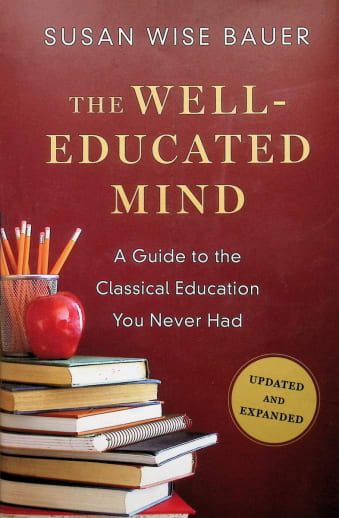So you've read The Well-Trained Mind by Susan Wise-Bauer and you're pleased by its information, guidance and practical curriculum suggestions. However, while reading it you may have thought, "I wish I had been educated this way, I guess it's too late for me." In the Well-Educated Mind, Susan focuses on the adult, and her premise is that it's not too late; you can have a Well-Educated Mind. Susan's focus is on helping the adult learn to read great literature. This book is so much more than a list of suggested reading. In fact, the suggested reading doesn't come until after Susan presents significant information on why it's important and how to go about it.
Yes, the trivium - grammar, logic and rhetoric is presented as well. Would you expect anything less from this author? Susan discusses why it is important for children to be taught properly in all three stages and if you were not, how as an adult, you can compensate and learn to read great literature. Susan's goal is to equip her readers to be able to learn self-education to train and fill their minds.
For people who question their ability to read difficult material, the book states, "If you can understand a daily newspaper, there's no reason you can't read and enjoy Shakespeare's sonnets or Jane Eyre." Susan says, "Reading is a discipline, like running regularly, or meditating, or taking voice lessons." Just like working through a training regimen to become proficient in sports or music we must learn technique and train our minds to effectively tackle the great books.
Susan does not lecture from an ivory tower, but shows she can relate her understanding of real-life challenges to making time for the pursuit of reading. Her references to her struggles help make me feel like she understands real-life. These include the lure of TV after a long day, "just to vegetate for a few minutes, before I try to use my brain," or the call of email (including spam deletion). She includes a whole section on how to create a realistic reading schedule on your weekly calendar. A helpful section is including on training our minds to move from light reading and skimming for facts to more serious reading which leads to understanding. This "how-to" section includes information on reading mechanics, journaling, questioning and literary terms, all with examples. The book then progresses to six literary genres: fiction, autobiography, history, drama, poetry, and science with instructions on how to read each type. After each genre is a listing of literature with comprehensive summaries and the best versions of the books (with ISBN information). This new expanded and revised edition includes great 21st century works as well as essential readings in science. The selected reading lists usually have both a literary and a historical purpose. The Well-Educated Mind is a great resource that provides those adults who have a nagging sense of missing something in their literary education the practical techniques and guidance to regularly read and enjoy great literature. Jerry

